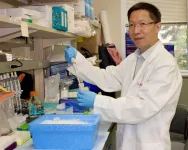(Press-News.org) In modern day agriculture, pesticides are essential to ensure high enough crop yields and food security. These chemicals, however, can adversely affect plant and animal life as well as the people exposed to them.
Now, in a population-based, nation-wide study, researchers in the US have put increased cancer risk through agricultural pesticide use into context with smoking, a better understood cancer risk factor. The results were published in Frontiers in Cancer Control and Society.
“In our study we found that for some cancers, the effect of agricultural pesticide usage is comparable in magnitude to the effect of smoking,” said the study’s senior author, Dr Isain Zapata, associate professor at the Rocky Vista University, College of Osteopathic Medicine in Colorado.
Contextualizing cancer risk
“We accept that a person who is not a farmer living in a community with heavy agricultural production is exposed to many of the pesticides used in their vicinity. It becomes part of their environment,” Zapata said.
The researchers found that in such an environment, the impact of pesticide use on cancer incidence rivaled that of smoking. They strongest association was among non-Hopkins lymphoma, leukemia, and bladder cancer. In these types of cancers, the effects of pesticide exposure were more pronounced than the effects of smoking.
“We present a list of major pesticide contributors for some specific cancers, but we highlight strongly that it is the combination of all of them and not just a single one that matters,” Zapata pointed out.
Pesticide cocktails
Because pesticides aren’t used one at a time, the researchers said it is unlikely that one alone is to blame. Although some pesticides are discussed more frequently than others, all – and mostly their combination – can have an impact. Accordingly, the researchers included 69 pesticides for which use data is available via the United States Geological Survey. “In the real world, it is not likely that people are exposed to a single pesticide, but more to a cocktail of pesticides within their region,” Zapata said.
The researchers said their study is the first comprehensive evaluation of cancer risk from a population-based perspective at a national level. So far, no large-scale study had examined the big picture and put pesticide use in context with a cancer risk factor that is no longer questioned, in this case smoking. “It is difficult to explain the magnitude of an issue without presenting any context, so we incorporated smoking data. We were surprised to see estimates in similar ranges,” Zapata said.
Seeing the bigger picture
The researchers said that while their study extends knowledge about pesticide use in the US, cancer risk factors are complicated and assessing the big picture may not reflect individual outcomes. For example, geography has a strong impact. In regions where more crops are grown, such as the Midwest, which is famous for its corn production, the associations between pesticides and cancer incidence were more striking.
Getting people, also those who are not exposed to pesticides frequently, to think about the problems pesticide use poses in a bigger context is one of the researchers’ goals.
“Every time I go to the supermarket to buy food, I think of a farmer who was part of making that product. These people often put themselves at risk for my convenience and that plays a role in my appreciation for that product. It definitely has had an impact on how I feel when that forgotten tomato in the fridge goes bad and I have to put it in the trash,” said Zapata.
END
Pesticides potentially as bad as smoking for increased risk in certain cancers
Researchers assessed the impact of commonly used agricultural pesticides on cancer incidence and found that pesticide use is associated with increased cancer risk
2024-07-25
ELSE PRESS RELEASES FROM THIS DATE:
NUS researchers develop new battery-free technology to power electronic devices using ambient radiofrequency signals
2024-07-25
Ubiquitous wireless technologies like Wi-Fi, Bluetooth, and 5G rely on radio frequency (RF) signals to send and receive data. A new prototype of an energy harvesting module – developed by a team led by scientists from the National University of Singapore (NUS) – can now convert ambient or ‘waste’ RF signals into direct current (DC) voltage. This can be used to power small electronic devices without the use of batteries.
RF energy harvesting technologies, such as this, is essential as they reduce battery dependency, extend device lifetimes, minimise environmental impact, and enhance the feasibility of wireless sensor networks and IoT devices in remote ...
New protein discovery may influence future cancer treatment
2024-07-25
Researchers from the University of Otago, Christchurch, have spearheaded the discovery of a protein function which has the potential to guide the development of novel cancer treatment options and improve the diagnosis of various cancers.
The exciting research finding, carried out alongside Dr Vanessa Morris from the University of Canterbury’s School of Biological Sciences as well as researchers in Australia and Denmark, centres on the activity of a tumour- suppressing protein called p16.
The discovery, published in the British scientific journal Nature Communications and first authored by ...
Timing matters: Scripps Research study shows ways to improve health alerts
2024-07-25
LA JOLLA, CA—When seemingly healthy people receive an alert from a wearable sensor telling them they might have a respiratory virus—based on small changes in their unique heartrate, sleep and activity patterns—what do they do? According to a new study by Scripps Research scientists carried out at the height of the COVID-19 pandemic, only a quarter of people follow up such an alert with an at-home viral test.
That is just one conclusion of the new study, published in The Lancet Digital Health on July 24, 2024, which tested the feasibility ...
New gene therapy approach shows promise for Duchenne muscular dystrophy
2024-07-25
INDIANAPOLIS - Indiana University School of Medicine researchers have made a significant breakthrough in developing a new gene therapy approach that restores full-length dystrophin protein, which could lead to new treatments for people with Duchenne muscular dystrophy (DMD).
The study, recently published in Nature Communications, demonstrates the effectiveness of their novel gene therapy technology in improving muscle tissue and overall strength in mice models with Duchenne ...
Chemical analyses find hidden elements from renaissance astronomer Tycho Brahe’s alchemy laboratory
2024-07-25
In the Middle Ages, alchemists were notoriously secretive and didn’t share their knowledge with others. Danish Tycho Brahe was no exception. Consequently, we don’t know precisely what he did in the alchemical laboratory located beneath his combined residence and observatory, Uraniborg, on the now Swedish island of Ven.
Only a few of his alchemical recipes have survived, and today, there are very few remnants of his laboratory. Uraniborg was demolished after his death in 1601, and the building materials were scattered for reuse.
However, during an excavation ...
Pacific Northwest launches clean hydrogen energy hub
2024-07-25
RICHLAND, Wash.—The Pacific Northwest is set to begin work building out a clean hydrogen economy with today’s announcement of a Phase 1 funding award from the Department of Energy. The $27.5 million award to the Pacific Northwest Hydrogen Association (PNWH2), a multi-state nonprofit organization, will be matched by industry partners up to $125 million in Phase 1 of the project.
DOE’s Pacific Northwest National Laboratory will serve as an advisor to the PNWH2 by conducting life-cycle analysis to predict and understand the planned hydrogen energy infrastructure impact on decreasing emissions and aiding in community engagement.
Public ...
Tiny deletion in heart muscle protein briefly affects embryonic ventricles but has long-term effects on adult atrial fibrillation
2024-07-25
BIRMINGHAM, Ala. – Millions of adults have atrial fibrillation — an irregular beating of the upper chambers of the heart that yields increased risk of heart failure, stroke and death. Many genetic mutations in the developing fetus can lead to adult atrial fibrillation, including mutations that shorten the massive protein titin in cardiac muscle cells.
Now, in a study in zebrafish and human heart muscle cells, researchers show that a tiny deletion in the A-band of titin — the loss of just nine amino acids out of more than 27,000 to 35,000 amino acids of an intact titin protein — causes a developmental ...
Harms of prescribing NSAIDs to high risk groups estimated to cost NHS £31m over 10 years
2024-07-25
Prescribing non-steroidal anti-inflammatory drugs (NSAIDs) to people at high risk of harm from them is estimated to cost the NHS in England around £31 million and cause more than 6,000 lost years of good health over 10 years, finds a study published by The BMJ today.
NSAIDs continue to be a source of avoidable harm and healthcare costs, and more needs to be done to address this, especially in high risk groups, say the researchers.
NSAIDs are used for pain and inflammation and are one of the most widely prescribed groups of medicines in the world, But they are known to increase the risk of gastrointestinal bleeding, heart attacks, stroke, and kidney damage.
Yet ...
Wearing a face mask in public spaces cuts risk of common respiratory symptoms, suggests Norway study
2024-07-25
Wearing a surgical face mask in public spaces reduces the risk of self-reported respiratory symptoms, finds a trial of adults in Norway published by The BMJ today.
The effect was moderate - a 3.2% reduction in symptoms, equivalent to around 3,300 fewer infections per 100,000 people - but the researchers say these results support the claim that face masks may be an effective measure to reduce the rate of self-reported symptoms consistent with respiratory tract infections.
Observational studies suggest that face masks reduce the risk of respiratory tract infections, but findings from randomised ...
Some private biobanks overinflating the value of umbilical cord blood banking in marketing to expectant parents
2024-07-25
Some private UK biobanks may be misleading expectant parents about the value of storing umbilical cord blood to treat life-threatening diseases that may arise in their child in the future, reveals an investigation by The BMJ, published today.
Over the past decade growing numbers of parents have chosen to store blood from the umbilical cord, which contains stem cells, in case their infant develops a condition that could be treated with stem cell therapy.
Parents must use a private biobank which charges around £550 ...
LAST 30 PRESS RELEASES:
Green hydrogen without forever chemicals and iridium
Billion-DKK grant for research in green transformation of the built environment
For solar power to truly provide affordable energy access, we need to deploy it better
Middle-aged men are most vulnerable to faster aging due to ‘forever chemicals’
Starving cancer: Nutrient deprivation effects on synovial sarcoma
Speaking from the heart: Study identifies key concerns of parenting with an early-onset cardiovascular condition
From the Late Bronze Age to today - Old Irish Goat carries 3,000 years of Irish history
Emerging class of antibiotics to tackle global tuberculosis crisis
Researchers create distortion-resistant energy materials to improve lithium-ion batteries
Scientists create the most detailed molecular map to date of the developing Down syndrome brain
Nutrient uptake gets to the root of roots
Aspirin not a quick fix for preventing bowel cancer
HPV vaccination provides “sustained protection” against cervical cancer
Many post-authorization studies fail to comply with public disclosure rules
GLP-1 drugs combined with healthy lifestyle habits linked with reduced cardiovascular risk among diabetes patients
Solved: New analysis of Apollo Moon samples finally settles debate about lunar magnetic field
University of Birmingham to host national computing center
Play nicely: Children who are not friends connect better through play when given a goal
Surviving the extreme temperatures of the climate crisis calls for a revolution in home and building design
The wild can be ‘death trap’ for rescued animals
New research: Nighttime road traffic noise stresses the heart and blood vessels
Meningococcal B vaccination does not reduce gonorrhoea, trial results show
AAO-HNSF awarded grant to advance age-friendly care in otolaryngology through national initiative
Eight years running: Newsweek names Mayo Clinic ‘World’s Best Hospital’
Coffee waste turned into clean air solution: researchers develop sustainable catalyst to remove toxic hydrogen sulfide
Scientists uncover how engineered biochar and microbes work together to boost plant-based cleanup of cadmium-polluted soils
Engineered biochar could unlock more effective and scalable solutions for soil and water pollution
Differing immune responses in infants may explain increased severity of RSV over SARS-CoV-2
The invisible hand of climate change: How extreme heat dictates who is born
Surprising culprit leads to chronic rejection of transplanted lungs, hearts
[Press-News.org] Pesticides potentially as bad as smoking for increased risk in certain cancersResearchers assessed the impact of commonly used agricultural pesticides on cancer incidence and found that pesticide use is associated with increased cancer risk




